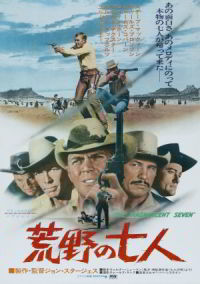 “The American copy is a disappointment, although entertaining. It is not a version of Seven Samurai. I do not know why they call it that.” This is how Kurosawa described The Magnificent Seven, our AK film club‘s film for August, in an interview with R.B. Gadi in 1966 (quoted from Cardullo). The American film is, of course, a remake of our last month’s film, Seven Samurai.
“The American copy is a disappointment, although entertaining. It is not a version of Seven Samurai. I do not know why they call it that.” This is how Kurosawa described The Magnificent Seven, our AK film club‘s film for August, in an interview with R.B. Gadi in 1966 (quoted from Cardullo). The American film is, of course, a remake of our last month’s film, Seven Samurai.
Released in October 1960, The Magnificent Seven was something of a commercial success, but not quite a critical one. The New York Times reviewer Howard Thompson called it “a pallid, pretentious and overlong reflection of the Japanese original”, while Variety approved of the first two thirds of the film describing it as “a rip-roaring rootin’ tootin’ western with lots of bite and tang and old-fashioned abandon”, but found the finish disappointing. The film has since gained a more positive image, possibly through its repeated showings on television, as well as thanks to its star studded cast.
According to Martinez, who dedicates a number of pages on The Magnificent Seven and Seven Samurai, the film was originally to be set in the American Civil War, with Martin Ritt to direct from a script that would have been closer to Kurosawa’s original than what was ultimately filmed. In the end, however, it was John Sturges who helmed the production, while Ritt would go on to do his own Kurosawa remake four years later with The Outrage.
While The Magnificent Seven retains many of the characters and plot points from the original, by moving the story to the American old west it necessarily has to change much of what is at the very core of the original film. Many of the central themes suggested by Seven Samurai (see for instance my introduction to Seven Samurai from last month) have either been changed or removed completely, and it is therefore interesting to look at The Magnificent Seven in terms of how it translates, or doesn’t translate, the original for western audiences. It is also worth paying special attention to Elmer Bernstein’s music for the film, which was nominated for an Academy Award, and at times appears to echo the more oriental soundscapes of Fumio Hayasaka’s score for Seven Samurai.
While reflecting its source, the translation also has to wrestle with the demands and traditions of its target language, that of the American western. In many ways, The Magnificent Seven is a very typical western, but in others it goes against certain genre conventions. One of these is the film’s group of heroes, as opposed to the more standard setup of a lone hero and his sidekick.
Thanks to its commercial success, The Magnificent Seven spawned three sequels and was later resurrected in the 1998 television series of the same name. As we heard in May, a remake of the film is currently in production, with Tom Cruise reportedly attached to the project.
In September, we will be discussing Kurosawa’s Record of a Living Being. Information about the film’s home video availability can be found here. For the full Film Club schedule, see here.






I watched it last weekend – for the first time in a very long time. I think I saw it a couple of times as a teenager (and maybe even younger) and loved it – of course Britt was my favourite as he was with most young boys I think.
My main feeling was one of disappointment – it is much worse than I remembered! I was very surprised though about how many scenes are almost direct copies of Seven Samurai, I hadn’t realised the films were so close in structure. But of course the direction is far more crude – a good example being the ‘ambush’ scene where Britt picks a cactus flower while waiting for the bandits to come – it has nothing of the mystery and beauty of the equivalent scene in Seven Samurai. You’d wonder really why they bothered.
The ‘making of’ film with my dvd copy was very interesting. It seems that pre-production and filming was a bit of a mess, with egos and politics constantly getting in the way of filming. I think it shows in the slightly awkward flow of the film, not to mention the occasionally bizarre casting. I don’t think Sturges really had much control over the film and it was only the strength of the storyline, the charisma of the stars, and of course the great music that allowed everyone to overlook the films flaws, making it the huge success it was. But I can’t help feeling that it could have been so much better.